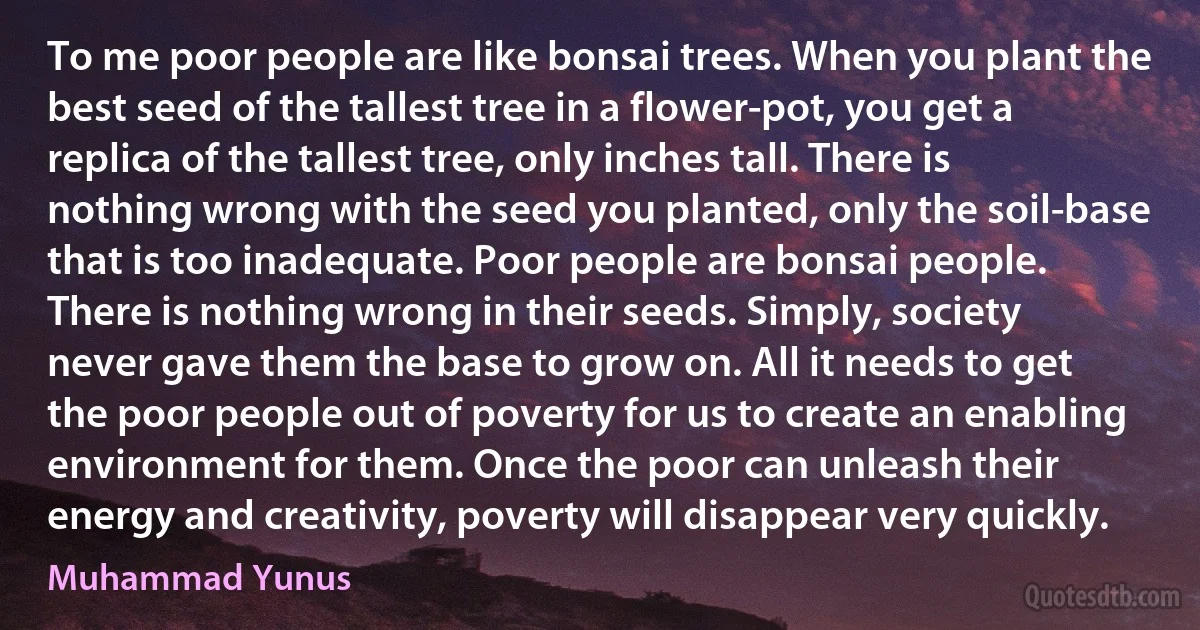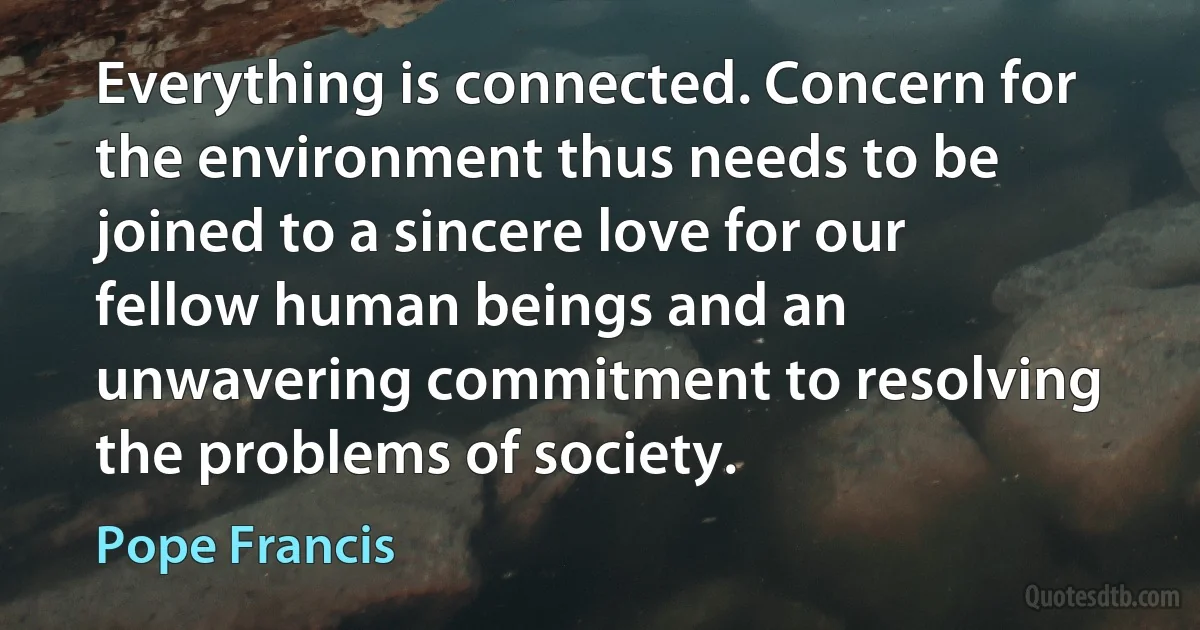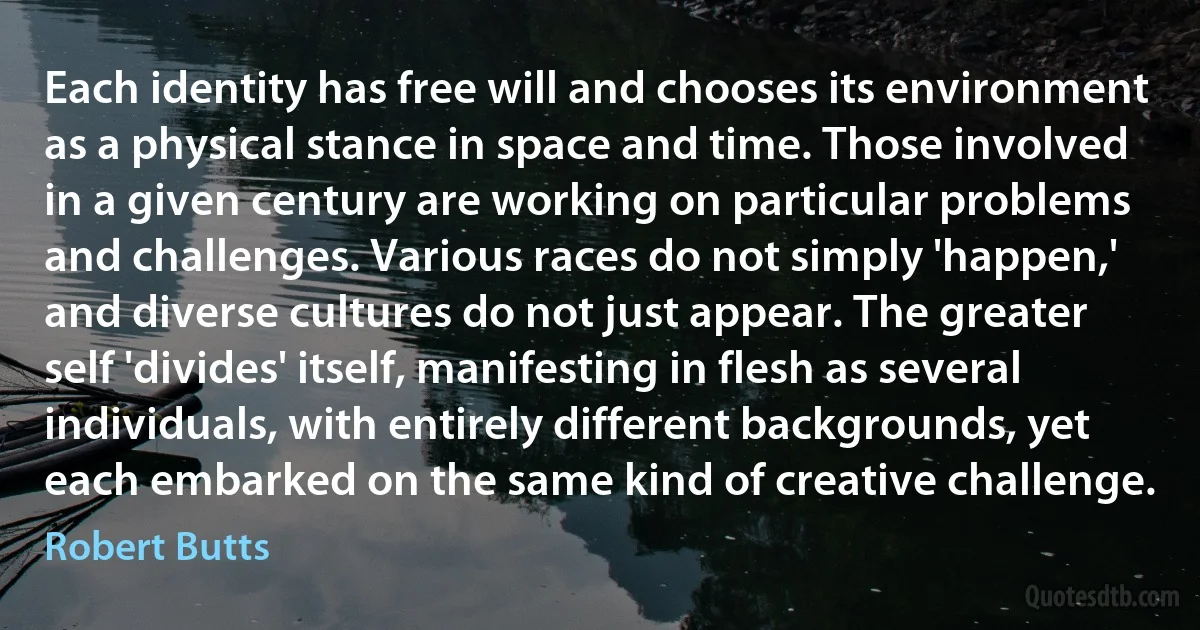Environment Quotes - page 29
We comprehend... that nuclear power is a real danger for mankind, that over-crowding of the planet is the greatest danger of all. We have understood that the destruction of the environment is another enormous danger. But I truly believe that the lack of adequate imagery is a danger of the same magnitude. It is as serious a defect as being without memory. What have we done to our images? What have we done to our embarrassed landscapes? I have said this before and will repeat it again as long as I am able to talk: if we do not develop adequate images we will die out like dinosaurs.

Werner Herzog
I have come to believe that you can get along without anyone - that is, without the close contact of any one person. That is a terrible shock to me, but I think it is true. You do need companionship, but wherever you go, in whatever new environment, you will find people who, to a large degree, take the place of those you left...The intimate companionship goes, I think, when you leave a friend, but friendship stays. It is an inherent possibility of relationship that, once admitted - well, there it is.

Anne Morrow Lindbergh
The real reason people are conservatives is that they are attached to the things that they love, and want to preserve them from abuse and decay. They are attached to their family, their friends, their religion, and their immediate environment. They have made a lifelong distinction between the things that nourish and the things that threaten their security and peace of mind.

Roger Scruton
The second requirement of a virus-friendly environment – that it should obey a program of coded instructions – is again only quantitatively less true for brains than for cells or computers. We sometimes obey orders from one another, but also we sometimes don't. Nevertheless, it is a telling fact that, the world over, the vast majority of children follow the religion of their parents rather than any of the other available religions. Instructions to genuflect, to bow towards Mecca, to nod one's head rhythmically towards the wall, to shake like a maniac, to "speak in tongues" – the list of such arbitrary and pointless motor patterns offered by religion alone is extensive – are obeyed, if not slavishly, at least with some reasonably high statistical probability.

Richard Dawkins
Economic powers continue to justify the current global system where priority tends to be given to speculation and the pursuit of financial gain, which fail to take the context into account, let alone the effects on human dignity and the natural environment. Here we see how environmental deterioration and human and ethical degradation are closely linked. Many people will deny doing anything wrong because distractions constantly dull our consciousness of just how limited and finite our world really is.

Pope Francis
Children have the right to grow up in a family with a father and mother capable of creating a suitable environment for the child's development and emotional maturity. Today marriage and the family are in crisis. We now live in a culture of the temporary, in which more and more people are simply giving up on marriage as a public commitment. The revolution in mores and morals has often flown the flag of freedom, but in fact it has brought spiritual and material devastation to countless human beings, especially the poorest and most vulnerable.

Pope Francis
Let's run it on down. White males are most responsible for the destruction of human life and environment on the planet today. Yet who is controlling the supposed revolution to change all that? White males (yes, yes, even with their pasty fingers back in black and brown pies again). It just could make one a bit uneasy. It seems obvious that a legitimate revolution must be led by, made by those who have been most oppressed: black, brown, and white women–with men relating to that as best they can. A genuine Left doesn't consider anyone's suffering irrelevant, or titillating; nor does it function as a microcosm of capitalist economy, with men competing for power and status at the top, and women doing all the work at the bottom (and functioning as objectified prizes or "coin" as well). Goodbye to all that.

Robin Morgan
What we wanted to preserve was not just a good environment in which to do programming, but a system around which fellowship could form. We knew from experience that the essence of communal computing, as supplied by remote-access, time-shared machines, is not just to type programs into a terminal instead of a keypunch, but to encourage close communication.

Dennis Ritchie
I think one of the interesting things about the Linux phenomenon is that [Linus] has been able to keep some kind of control over such an amazingly extended development environment. I'm certainly glad that I didn't have to develop C in public, because you get more suggestions than you really want. Being in this nice, small group, you can control that sort of thing. I honestly don't know the dynamics and the details of the Linux kernel project. However, one of the knocks on Linux is that it is undisciplined. But I think probably the fairer observation is that it is amazingly disciplined, compared to what you would expect, given the nature of the endeavor.

Dennis Ritchie
The biggest issue in this election is something called flip-flopping, and all candidates are accused of doing it. A strong leader is expected to maintain steadfast resolve in his opinion even if the environment changes or he gets new information. In any other context, that would be considered the first sign of a brain tumor. When presidents do it, it's called leadership, and frankly, we can't get enough of it.

Scott Adams
There were three men whose lives became confused in history and merged, and whose composite history became known as the life of Christ . . . Each was highly gifted psychically, knew of his role, and accepted it willingly. The three men were a part of one entity, gaining physical existence in one time. They were not born on the same date, however. There are reasons why the entity did not return as one person. For one thing, the full consciousness would be too strong for one physical vehicle. For another, the entity wanted a more diversified environment than could otherwise be provided.

Robert Butts
Part of the unknown reality, then, is hidden beneath language and the enforced pattern of accustomed words-so, for an exercise, look about your environment. Make up new, different 'words' for the objects that you see about you. Pick up any object, for example. Hold it for a few seconds, feel its texture, look at its color, and spontaneously give it a new name by uttering the sounds that come into your mind. See how the sounds bring out certain aspects of the object that you may not have noticed before. The new word will fit as much as the old one did. It may, in fact, fit better. Do this with many objects, following the same procedure. You can instead say the name of any object backwards. In such ways you break up to some extent the automatic patterning of familiar phrases, so that you can perceive the individuality that is within each object.

Robert Butts



